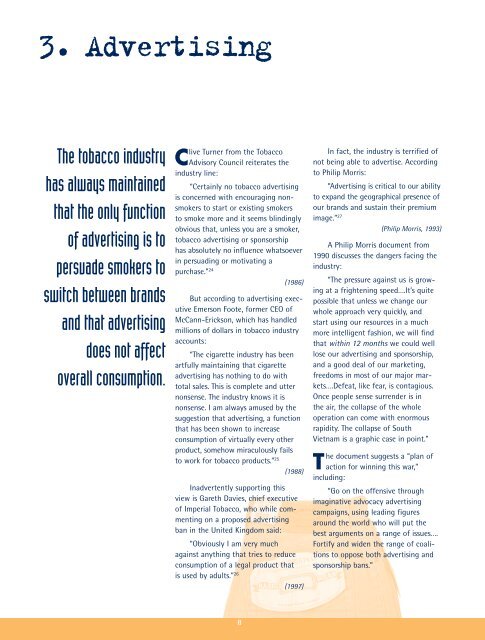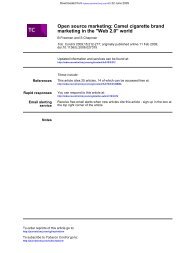Trust Us We're The Tobacco Industry - Tobacco Control Supersite
Trust Us We're The Tobacco Industry - Tobacco Control Supersite
Trust Us We're The Tobacco Industry - Tobacco Control Supersite
Create successful ePaper yourself
Turn your PDF publications into a flip-book with our unique Google optimized e-Paper software.
3. Advertising<br />
<strong>The</strong> tobacco industry<br />
has always maintained<br />
that the only function<br />
of advertising is to<br />
persuade smokers to<br />
switch between brands<br />
and that advertising<br />
does not affect<br />
overall consumption.<br />
Clive Turner from the <strong>Tobacco</strong><br />
Advisory Council reiterates the<br />
industry line:<br />
“Certainly no tobacco advertising<br />
is concerned with encouraging nonsmokers<br />
to start or existing smokers<br />
to smoke more and it seems blindingly<br />
obvious that, unless you are a smoker,<br />
tobacco advertising or sponsorship<br />
has absolutely no influence whatsoever<br />
in persuading or motivating a<br />
purchase.” 24<br />
8<br />
(1986)<br />
But according to advertising executive<br />
Emerson Foote, former CEO of<br />
McCann-Erickson, which has handled<br />
millions of dollars in tobacco industry<br />
accounts:<br />
“<strong>The</strong> cigarette industry has been<br />
artfully maintaining that cigarette<br />
advertising has nothing to do with<br />
total sales. This is complete and utter<br />
nonsense. <strong>The</strong> industry knows it is<br />
nonsense. I am always amused by the<br />
suggestion that advertising, a function<br />
that has been shown to increase<br />
consumption of virtually every other<br />
product, somehow miraculously fails<br />
to work for tobacco products.” 25<br />
(1988)<br />
Inadvertently supporting this<br />
view is Gareth Davies, chief executive<br />
of Imperial <strong>Tobacco</strong>, who while commenting<br />
on a proposed advertising<br />
ban in the United Kingdom said:<br />
“Obviously I am very much<br />
against anything that tries to reduce<br />
consumption of a legal product that<br />
is used by adults.” 26<br />
(1997)<br />
In fact, the industry is terrified of<br />
not being able to advertise. According<br />
to Philip Morris:<br />
“Advertising is critical to our ability<br />
to expand the geographical presence of<br />
our brands and sustain their premium<br />
image.” 27<br />
(Philip Morris, 1993)<br />
A Philip Morris document from<br />
1990 discusses the dangers facing the<br />
industry:<br />
“<strong>The</strong> pressure against us is growing<br />
at a frightening speed….It’s quite<br />
possible that unless we change our<br />
whole approach very quickly, and<br />
start using our resources in a much<br />
more intelligent fashion, we will find<br />
that within 12 months we could well<br />
lose our advertising and sponsorship,<br />
and a good deal of our marketing,<br />
freedoms in most of our major markets….Defeat,<br />
like fear, is contagious.<br />
Once people sense surrender is in<br />
the air, the collapse of the whole<br />
operation can come with enormous<br />
rapidity. <strong>The</strong> collapse of South<br />
Vietnam is a graphic case in point.”<br />
<strong>The</strong> document suggests a “plan of<br />
action for winning this war,”<br />
including:<br />
“Go on the offensive through<br />
imaginative advocacy advertising<br />
campaigns, using leading figures<br />
around the world who will put the<br />
best arguments on a range of issues….<br />
Fortify and widen the range of coalitions<br />
to oppose both advertising and<br />
sponsorship bans.”




